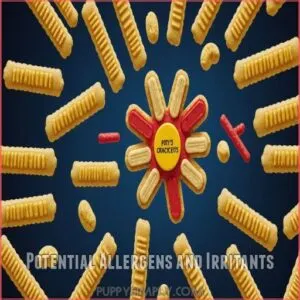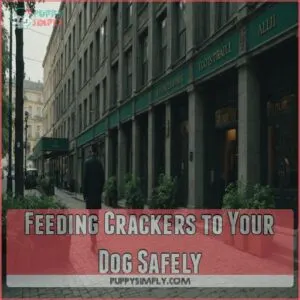This site is supported by our readers. We may earn a commission, at no cost to you, if you purchase through links.

Too many animal crackers can lead to weight gain, digestive upset, and other problems. Instead of risking it, try safer alternatives like plain, unsalted dog biscuits or healthy fruits and veggies.
Want to learn more about choosing the perfect treats for your furry friend? Read on!
Table Of Contents
- Key Takeaways
- What Are Animal Crackers
- Risks of Giving Animal Crackers to Dogs
- Health Concerns Linked to Animal Crackers
- Safe Alternatives to Animal Crackers
- Choosing The Right Treats for Your Dog
- Crackers and Dogs: General Considerations
- Specific Risks Associated With Crackers
- Feeding Crackers to Your Dog Safely
- Prioritizing Your Dog’s Health
- Frequently Asked Questions (FAQs)
- Are animal Crackers bad for dogs?
- Can dogs eat wafer crackers?
- Can dogs eat cheese crackers?
- Can dogs eat butter crackers?
- What kind of animal crackers can dogs eat?
- Will animal crackers harm my dog?
- Are animal crackers dog-safe?
- How often can dogs eat animal crackers?
- Can puppies have animal crackers?
- Are there organic animal crackers for dogs?
- Do animal crackers affect dogs dental health?
- Can small dogs eat animal crackers safely?
- Conclusion
Key Takeaways
- Avoid giving animal crackers to your dog as they contain high sugar and salt, which are not good for their health.
- Opt for dog-specific treats instead, ensuring they are nutritionally balanced and free from harmful ingredients.
- Puppies and small dogs should particularly stay away from animal crackers due to their developing systems and size.
- Always consult your vet for safe and healthy snack options tailored to your dog’s needs.
What Are Animal Crackers
You might remember animal crackers from childhood as fun, animal-shaped cookies. They’re typically made with ingredients like wheat and milk, making them tasty but not especially healthy for dogs.
History of Animal Crackers
Animal crackers have a delightful history! Originating in the late 1800s, early animal cracker makers crafted these treats to mimic circus animals.
By the 1900s, they became a staple in snack time.
- Popular animal shapes: Lions, tigers, and bears.
- Cultural impact: Iconic snack in many childhoods.
- Modern brands: Barnum’s Animals still lead the pack.
These cookies aren’t just for kids; they’re a nostalgic journey back in time!
Ingredients in Animal Crackers
So, you’re curious about what’s actually in those cute animal crackers?
They usually contain milk, wheat, sugar, and salt.
You’ll also find preservatives and sometimes other additives.
While not toxic, these ingredients aren’t ideal for your dog’s diet.
Too much sugar and salt aren’t good for their health, and some dogs have allergies to wheat or milk.
Think of it this way: animal crackers are a tasty treat for you, but not a healthy snack for your furry friend.
Stick to dog food and dog snacks instead!
Risks of Giving Animal Crackers to Dogs
When you give your dog animal crackers, you might be unwittingly exposing them to high sugar and calorie content, which can lead to weight gain and health issues.
Additionally, these treats contain potential allergens and irritants like wheat and gelatin, posing further risks to your pet’s well-being.
High Sugar and Calorie Content
You might think those cute animal-shaped snacks are harmless, but they pack a sugary punch.
Let’s tackle the big issues:
- Weight gain: Dogs can’t burn off calories like we do.
- Diabetes risk: High sugar spikes can lead to serious health problems.
- Dental issues: Sugar can wreak havoc on your dog’s teeth.
For healthier options, consider commercial dog treats.
Potential Allergens and Irritants
While considering what treats are safe for your dog, it’s worth noting the potential allergens in animal crackers.
Wheat allergies and gelatin sensitivity can trigger dog sensitivities.
You can review a list of common animal crackers ingredients to better understand what goes into them, such as at animal crackers ingredients.
Salt intake and artificial flavors may disrupt dog digestion.
Check this quick overview:
| Potential Allergen | Possible Issues |
|---|---|
| Wheat | Allergies |
| Gelatin | Sensitivity |
| Salt | Water retention |
| Artificial Flavors | Digestive upset |
Health Concerns Linked to Animal Crackers
Feeding your dog animal crackers might seem harmless, but these tasty treats can lead to weight gain and obesity.
Additionally, they raise concerns about diabetes, heart disease, joint problems, and digestive issues, which are worth considering before sharing them with your furry friend.
Weight Gain and Obesity
Imagine indulging your pup regularly in animal crackers might seem innocent, but it can lead to weight gain and obesity.
Excessive treats add up, harming dog weight management and pet health.
Focus on obesity prevention by opting for healthy dog diets and exercise.
Homemade treats offer safer indulgence, keeping your furry friend fit and lively.
Choose wisely for dog safety!
Diabetes and Heart Disease
It’s not just weight management that’s a concern.
High sugar impact in animal crackers can lead to serious health risks like diabetes and heart disease in dogs.
Here’s how:
- Sugar Spikes: Causes insulin resistance.
- Heart Strain: Excess weight strains heart health.
- Exercise Routine: Needs more effort with extra pounds.
Consult your veterinarian for specific guidance.
Joint Problems and Digestive Issues
Because of their high sugar and fat content, animal crackers aren’t ideal for your dog’s health.
Too many can contribute to weight gain, potentially stressing joints.
The ingredients might also upset their tummy, causing digestive issues.
For better dog nutrition, opt for vet-recommended treats or fresh fruits.
Remember, a balanced diet is key to your dog’s overall well-being!
Consult your vet or an online vet for personalized advice on dog joint health and digestive health.
Safe Alternatives to Animal Crackers
When you’re looking for healthier snack options for your dog, homemade treats or commercial dog treats specifically designed for canine nutrition can be great choices.
Fresh fruits and vegetables, like apple slices or carrot sticks, also offer safe and tasty rewards for your furry friend.
Homemade Dog Treats
When you want to ditch those animal crackers for dogs, try home-cooked treats.
They’re healthy and packed with love.
To create your own:
- Ingredients: Use pumpkin, peanut butter, or oat flour.
- DIY Process: Blend, shape, and bake.
- Storage: Store in an airtight container to prolong freshness and flavor.
Commercial Dog Treats
With a world of commercial dog treat brands, you’ve got options far healthier than animal crackers.
Look for treats with simple, natural ingredients, steering clear of excess sugar.
Consider browsing online stores that offer dog safe crackers.
Compare quality by checking labels, ensuring safety for your furry friend.
Store them properly to keep them fresh and tasty.
Always prioritize treats that support your dog’s health, not just their cravings.
Fresh Fruits and Vegetables
Imagine your dog happily munching on fresh fruits and veggies instead of animal crackers.
They’re tasty, healthy, and offer a natural boost to your dog’s diet.
Consider these options:
- Apples: Core and peel them first.
- Carrots: Crunchy and fun.
- Green beans: Low-calorie treat.
- Blueberries: Antioxidant-rich snack.
Healthy choices can sidestep risks and bring benefits!
Choosing The Right Treats for Your Dog
When choosing treats for your dog, prioritize options that align with their nutritional needs and health goals.
Consult your vet, read labels carefully, and make sure you’re not overfeeding to keep your dog happy and healthy.
Consult Your Veterinarian
You’ve explored safe snack alternatives; now it’s time to consult your veterinarian.
They know your dog’s unique health concerns and can recommend treats that are as healthy as air-popped popcorn for dogs(air-popped popcorn). They know your dog’s unique health concerns and can recommend vet-approved treats that avoid dog treat allergies and food sensitivities.
A quick chat with your vet makes sure you’re not barking up the wrong tree with your choices, giving your pup the best health and happiness.
Read Labels Carefully
Before giving your dog a treat, scrutinize the label, and consider exploring websites that specialize in dog-safe products, such as stores that sell animal crackers for dogs.
Hidden ingredients, like xylitol, are incredibly dangerous.
Check the nutritional value; you want treats low in sugar and salt.
Avoid anything with ingredients known to harm dogs.
Prioritize dog-safe alternatives for a healthy pup.
Reading labels carefully makes sure your furry friend gets only the best!
Avoid Overfeeding
While snacking is tempting, overfeeding dogs, even with animal crackers, can lead to health issues like obesity. Keep treats a small part of their diet and make sure they align with your dog’s activity level.
- Opt for dog treat alternatives that meet nutritional needs.
- Use portion control tips to manage treat sizes.
- Aim for healthy weight goals by balancing snacking frequency.
Crackers and Dogs: General Considerations
Feeding your dog crackers requires keeping an eye on the ingredients for their safety.
Opt for unsalted, whole-grain options and steer clear of those high in sodium and additives to avoid potential health issues.
Unsalted, Whole-Grain Crackers
Choosing unsalted, whole-grain crackers for your dog’s snack time can have benefits up your sleeve.
These crackers often provide essential nutrients with a crunch that dogs love. However, it’s vital to avoid crackers with high sodium content, like saltine crackers nutrition, which can lead to digestive issues and other health problems. Remember, moderation is key.
| Type | Benefit |
|---|---|
| Whole-Grain Crackers | Nutritional Value |
| Unsalted Options | Low Sodium |
| Dog Snack Ideas | Healthy Crunch |
Consider these factors for a healthier treat option.
Sodium Content and Additives
Careful mom or dad, those crackers could be tiny salt mines for your pup.
Dogs don’t handle sodium like we do, and high sodium content can lead to dehydration or worse.
Keep an eye out for toxic additives lurking in ingredients. Opt for sodium-free options when rewarding with crackers to support your dog’s health and follow safe snacking guidelines.
Specific Risks Associated With Crackers
While many crackers seem harmless, some ingredients pose real dangers to your dog.
High sodium levels, certain additives, and even choking hazards are all things you should be aware of before sharing your snacks.
Allergies and Sensitivities
Some dogs might be allergic to animal crackers, which can cause different issues. Recognizing sensitivity signs is important.
- Food Allergy Tests: Consider these if allergies are suspected.
- Canine Skin Issues: Watch for itching or redness.
- Common Dog Allergens: Wheat or gelatin might be problematic.
- Allergy Prevention Tips: Gradually introduce treats to your dog’s diet.
Choking Hazards
Allergy worries aside, let’s chat about choking hazards.
A dog’s ardor for snacks means cracker size risks are real.
Similarly, wood-related choking hazards are a significant concern, as wood chewing poses serious dangers.
Swallowing whole crackers can make them gag.
For safe snacking, break them into small pieces to prevent airway obstruction.
Remember, Rover loves crunchy fun, but we don’t want to rush him to the vet.
Keep it playful and safe!
| Risk | Prevention | Why It Matters |
|---|---|---|
| Cracker Size Risks | Small Cracker Pieces | Reduces choking chance |
| Swallowing Whole | Dog Gagging Prevention | Avoids vet visits |
| Airway Obstruction | Break into Pieces | Keeps breathing easy |
Toxic Ingredients
Animal crackers might seem harmless, but they hide toxic ingredients similar to those found in high sodium hot dogs, that harm your dog.
Watch for:
- Xylitol: A sugar substitute that can drop blood sugar levels dangerously.
- Chocolate: Even in small amounts, it’s harmful to dogs.
- Artificial Sweeteners and Spices: Ingredients like onion powder and garlic salt can cause digestive trouble and damage red blood cells.
Feeding Crackers to Your Dog Safely
When feeding crackers to your dog, remember that moderation is key to avoid unnecessary health issues.
It’s important to monitor your dog’s health and introduce new types of crackers gradually to check for any adverse reactions.
Moderation is Key
Balancing the risks associated with crackers requires a sprinkle of moderation.
Feed your dog animal crackers sparingly, considering treat frequency and dog weight.
Opt for snack alternatives like homemade treats that align with a healthy diet.
Remember, just because they beg doesn’t mean they need it.
A little bit of restraint can keep those tails wagging happily!
Monitor Your Dog’s Health
After giving your dog crackers, keep a close eye on their health.
Note any changes in their dog weight, water intake, or energy levels.
If your dog stops eating for more than 48 hours and shows signs of dehydration, it’s essential to seek immediate veterinary attention.
Diarrhea or vomiting are signs of a problem.
If you see anything unusual, contact your vet immediately.
A little caution goes a long way in keeping your dog safe and healthy.
Trust your instincts; you know your dog best.
Introduce New Crackers Gradually
Keeping a close eye on your dog’s health is a smart move.
Now, when introducing new crackers, approach like introducing new neighbors: slow and steady is best. It helps spot any dog food allergies or cracker sensitivity.
Here’s how:
- Start with small pieces.
- Watch for any food reactions.
- Make sure you have safe snacking routines.
Prioritizing Your Dog’s Health
To keep your dog healthy and happy, focus on maintaining balanced eating habits and regular exercise.
Avoid giving in to those puppy eyes for unhealthy snacks like animal crackers, and instead, opt for nutritious treats that support your dog’s well-being.
Healthy Eating Habits
Switching gears, focus on creating healthy eating habits for your dog, just like being mindful of low-sodium beef jerky. Switching gears, focus on creating healthy eating habits for your dog.
Explore quality dog food brands, consider homemade options, and learn about the raw food diet.
Understand your dog’s food allergies and choose dog treats wisely, such as opting for healthy dog treats made with wholesome ingredients.
Remember, a healthy diet scores a win for your dog’s wellbeing.
| Habit | Benefit | Tip |
|---|---|---|
| Balanced diet | Boosts energy | Opt for high-quality brands |
| Portion control | Maintains weight | Use measuring cups |
| Fresh options | Supports immunity | Include fruits and veggies |
Regular Exercise and Check-Ups
Your dog’s health thrives on regular exercise and check-ups.
Consider these key points:
- Exercise Benefits: Keeps your dog fit and prevents obesity.
- Vet Visits: Guarantee early detection of health issues.
- Weight Management: A balanced diet complements their active life.
Make workouts fun with games or walks, and schedule those vet appointments—you’ll add more wag to their tail!
Avoiding Unhealthy Snacks
You’ve aced your dog’s check-ups; now let’s talk snacks.
Avoid tempting treats like animal crackers.
To minimize risks, it’s crucial to be aware of the high sodium content in certain human foods, like tortilla chips risks. Opt for homemade dog treats or healthy dog snacks instead.
Prioritize dog weight management and avoid foods triggering dog food allergies.
Choose natural dog treats to help your pup stay healthy.
| Snack Type | Benefits |
|---|---|
| Homemade Treats | Controlled ingredients |
| Healthy Dog Snacks | Nutritionally balanced |
| Natural Dog Treats | Low additives |
| Fresh Fruits | Vitamins and minerals |
| Unsalted Crackers | Lower sodium |
Frequently Asked Questions (FAQs)
Are animal Crackers bad for dogs?
Are animal crackers a dog’s best friend? Not quite.
While they’re generally non-toxic, the high sugar and calorie content can harm your dog’s health.
It’s best to stick to treats specifically made for dogs.
Can dogs eat wafer crackers?
Wafer crackers aren’t toxic, but they lack nutrition for dogs.
They often contain sugar and salt, which aren’t ideal.
Stick to dog-specific treats or consult your vet for healthier snack options.
Healthier choices benefit your dog long-term.
Can dogs eat cheese crackers?
Cheese crackers might seem like a tasty treat for your dog, but they’re not ideal.
High in salt and fats, they can lead to health issues.
Choose low-sodium and grain-free options, or consult your vet for advice.
Can dogs eat butter crackers?
Dogs can safely munch on peanut butter crackers with natural ingredients, but be aware of the risks associated with highly processed ingredients, butter crackers in moderation, but don’t make it a habit.
They’re high in fats and salt, which can lead to weight gain and health issues.
Opt for healthier, dog-specific treats instead.
What kind of animal crackers can dogs eat?
You should only give your dog plain animal crackers without chocolate or xylitol.
They should be a rare treat due to their high sugar and calorie content.
Always consult your vet before introducing any new snacks.
Will animal crackers harm my dog?
Animal crackers aren’t toxic, but they’re not ideal. They’re high in sugar and calories. Too many could cause weight gain and health issues. Better to stick to dog-friendly treats.
Are animal crackers dog-safe?
Imagine this: your curious dog eyes your snack.
While animal crackers aren’t toxic, they’re not ideal due to their sugar and calorie content.
Opt for dog-specific treats to keep your pup healthy and happy.
Stay cautious!
How often can dogs eat animal crackers?
It’s best to limit animal crackers in your dog’s diet.
They’re not harmful in small amounts but offer little nutrition.
Frequent treats can lead to weight gain and health issues.
Opt for healthier dog-specific treats instead.
Can puppies have animal crackers?
You’d think puppies could handle anything, but animal crackers are a no-go.
They’re high in sugar and calories, which isn’t great for their developing systems.
Stick to healthier, vet-approved treats to keep them wagging happily.
Are there organic animal crackers for dogs?
You can find organic animal crackers for dogs, often made with natural ingredients like whole grains and no artificial flavors.
They’re designed to be safe and healthy, but always check labels for allergens your dog might have.
Do animal crackers affect dogs dental health?
Imagine teeth as the fortresses guarding a dog’s health.
Animal crackers, with their sugar and starch, can breach those defenses, leading to plaque buildup and cavities.
Opt for dog-friendly treats to keep those pearly whites strong.
Can small dogs eat animal crackers safely?
Small dogs can nibble on animal crackers occasionally without harm.
These treats lack nutritional value and pack sugar and calories that can lead to weight gain.
Consult your vet for healthier options.
Conclusion
Remember, "an ounce of prevention is worth a pound of cure." So, while the occasional accidental nibble of an animal cracker probably won’t kill your dog, it’s best to avoid them.
Can dogs eat animal crackers? The answer is a resounding "no" for regular consumption. Animal crackers are packed with sugar and salt, ingredients that aren’t good for your canine companion’s health.
Stick to safer, healthier treats designed specifically for dogs to keep your furry friend happy and healthy. Always prioritize your dog’s well-being and consult your vet if you have any concerns about your dog’s diet.
















